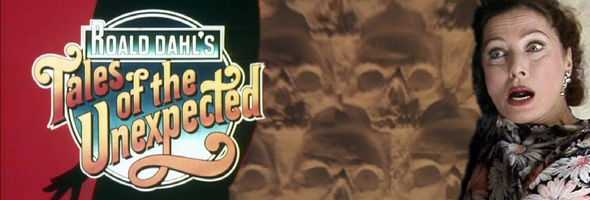
VOLUME ONE
Color, 1979-1980, 625m.
VOLUME TWO
Color, 1981-1982, 575m. / Acorn (US R1 NTSC)
In the suspenseful "Poison," a man (Lady Frankenstein's Andrew Ray) reading in bed finds a snake sliding up his stomach - while his best friend (Story of O's Anthony Steel) and his girlfriend (Doomwatch's Judy Geeson) have issues of their own. The always enjoyable Miriam Margolyes (The Apple) gets a rare leading role in "Fat Chance" as a woman whose philandering husband turns to a suspect doctor for weight loss aid. Ron Moody (Oliver!) offers a theatrical turn
Set 2 contains an additional 23 episodes and finds the show becoming noticeably more artistically ambitious. In "The Flypaper," a young girl is frightened by reports of a child murderer on the loose and begins to suspect that the creepy old man (Alfred Burke) who keeps following her might by the guilty party. It's a suitably eerie tale and compares favorably to similar work being done on Brian Clemens' magnificent Thriller series a few years earlier. In another wry con story, "A Picture of a Place," a con artist (British sex comedy staple Bill Maynard) at a farmhouse uncovers what he claims is a lost work by renowned landscape painter John Constable, then tries to figure out a way to get rich quick. In the chamber drama "Proof of Guilt," a police inspector (Roy Marsden) tries to figure out whether a man's shooting while only one other person was in the room could be as simple as it appears. In "Vengeance Is Mine Inc.," two enterprising lads
In "The Best of Everything," shy Arthur (Dracula A.D. 1972's Michael Kitchen) realizes the opportunity to finally woo his boss' beautiful daughter (Clash of the Titans' Judi Bowker) in the form of a new lodger, though the process might be more costly than he thought. Eli Wallach offers a typically top-rank performance in "Shatterproof" as a man forced to improvise a way out of his position at the end of a hit man's pistol, while "The Sound Machine" focuses on a newly created machine capable of translating audio information outside the range of human hearing... but the payoff is ironic indeed. A woman's disappearance in "Never Speak Ill of the Dead" prompts her friends to suspect that her doctor husband has bumped her off and buried her in the cellar, but their lynch mob confrontation doesn't turn out quite as planned. Nigel Hawthorne takes cetner stage in "The Last Bottle in the World" as a wine collector who owns the most valuable bottle of vino in existence; however, his decision to sell his prized possession to an odd millionaire doesn't have quite the pleasurable results intended. Then unscrupulous art dealer Madame La Grue (Donkey Skin's Micheline Presle) milks a clueless, starving artist for all he's worth, at least until his
As with many of its contemporary British series, Tales of the Unexpected veers between videotape and 16mm film, though thankfully not within the same episode. Though the film episodes look a bit rougher around the edges, they also display more of an artistic flourish overall with some imaginative outdoor shooting ("The Flypaper" is a standout example) while the video stories tend to
Acorn's releases come with four DVDs per set, and the episodes take up most of the disc space. (You also get a Dahl bio and cast filmographies.) Image quality depends on the source material; some of the earliest episodes look the roughest, and by the second season things were certainly looking slicker if not perfect. Mono audio is comparable to other programs of the period.
Though most know him as the lovably demented mind behind such macabre children's classics as Charlie and the Chocolate Factory, The Witches, and Matilda, Roald Dahl also excelled at wry short stories for adults. Published many times
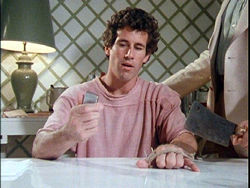 in a variety of volumes like Kiss Kiss, these mixtures of dark humor, horror, and fantasy were first brought to the public via TV anthology shows in the 1950s. Eventually Dahl decided to steer the ship himself and hosted a nearly decade-long series, Tales of the Unexpected, with approved adaptations of his tales providing most of the material. Hosting each episode from a cozy armchair in a drawing room, he offers anecdotes and insights into each story before the curtain rises; as the colorful opening credits might suggest with its collision of flames, undulating women, and gambling imagery, this show is quite difficult to classify but could best be desribed as a series of mordant vignettes all more of less offering a mystery or suspense narrative.
in a variety of volumes like Kiss Kiss, these mixtures of dark humor, horror, and fantasy were first brought to the public via TV anthology shows in the 1950s. Eventually Dahl decided to steer the ship himself and hosted a nearly decade-long series, Tales of the Unexpected, with approved adaptations of his tales providing most of the material. Hosting each episode from a cozy armchair in a drawing room, he offers anecdotes and insights into each story before the curtain rises; as the colorful opening credits might suggest with its collision of flames, undulating women, and gambling imagery, this show is quite difficult to classify but could best be desribed as a series of mordant vignettes all more of less offering a mystery or suspense narrative.
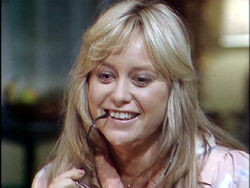 The first DVD set collects the complete first two seasons, kicking off with "The Man from the South" (filmed before and since in different incarnations of Alfred Hitchcock Presents). Josť Ferrer stars as Carlos, a gambler who initiates a gruesome bet with American sailor Michael Ontkean: if the latter's lighter ignites ten times in a row, the sailor wins a Jaguar; if not, he loses a finger. Though not as taut as the definitive Peter Lorre version, this is a decent introduction to the show and features a nicely indulgent performance from Ferrer. The wonderfully twitchy Julie Harris stars in "Mrs. Bixby and the Colonel's Coat" (adapted from the classroom staple short story) about an adulterous woman whose lover gives her a new coat - which she must then get past the eyes of her husband. The amusing "William and Mary" finds Elaine Stritch as a widow who learns that her ridiculously strict husband (who hated music, smoking, and
The first DVD set collects the complete first two seasons, kicking off with "The Man from the South" (filmed before and since in different incarnations of Alfred Hitchcock Presents). Josť Ferrer stars as Carlos, a gambler who initiates a gruesome bet with American sailor Michael Ontkean: if the latter's lighter ignites ten times in a row, the sailor wins a Jaguar; if not, he loses a finger. Though not as taut as the definitive Peter Lorre version, this is a decent introduction to the show and features a nicely indulgent performance from Ferrer. The wonderfully twitchy Julie Harris stars in "Mrs. Bixby and the Colonel's Coat" (adapted from the classroom staple short story) about an adulterous woman whose lover gives her a new coat - which she must then get past the eyes of her husband. The amusing "William and Mary" finds Elaine Stritch as a widow who learns that her ridiculously strict husband (who hated music, smoking, and 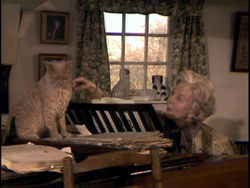 merriment of any kind) has now been preserved as a functioning brain, complete with sensory attachments. Susan George takes the helm for a remake of the famous "Lamb to the Slaughter," in which a murderous wife must dispose of her unorthodox weapon. In "The Landlady," a young man arrives at a boarding house and finds the genteel proprietor (Siobhan McKenna) so welcoming it's almost... sinister. Surprisingly bland considering its cast, "Neck" features Joan Collins as an unfaithful wife who puts herself in a tender spot at the hands of her husband (Michael Aldridge) and his butler (John Gielgud). Better is "Edward the Conqueror," in which a dotty woman (Wendy Hiller) is convinced her cat is the reincarnation of composer Franz Liszt - much to the consternation of her husband (Joseph Cotten). In the first of many gambling/con-related stories, "A Dip in the Pool," Jack Weston plays a boorish liner passenger who wagers his entire fortune that the captain has overshot on his estimate for the next day's travel... and goes
merriment of any kind) has now been preserved as a functioning brain, complete with sensory attachments. Susan George takes the helm for a remake of the famous "Lamb to the Slaughter," in which a murderous wife must dispose of her unorthodox weapon. In "The Landlady," a young man arrives at a boarding house and finds the genteel proprietor (Siobhan McKenna) so welcoming it's almost... sinister. Surprisingly bland considering its cast, "Neck" features Joan Collins as an unfaithful wife who puts herself in a tender spot at the hands of her husband (Michael Aldridge) and his butler (John Gielgud). Better is "Edward the Conqueror," in which a dotty woman (Wendy Hiller) is convinced her cat is the reincarnation of composer Franz Liszt - much to the consternation of her husband (Joseph Cotten). In the first of many gambling/con-related stories, "A Dip in the Pool," Jack Weston plays a boorish liner passenger who wagers his entire fortune that the captain has overshot on his estimate for the next day's travel... and goes 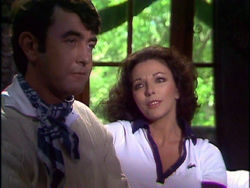 to dangerous lengths to prove himself the winner. Julie Harris pops up again for the comical "The Way Up to Heaven" as a woman with a paralyzing fear of being late; however, her husband gets a thrill from holding her up, resulting in a war of wits. Then it's Susan George again for one of the series' weirdest moments, "Royal Jelly," in which a tot's refusal to eat forces its beekeeper daddy to come up with an unorthodox solution. Derek Jacobi stars in "Skin" as a wandering immigrant whose flesh bears a most unusual artwork that holds the key to his future, however peculiar it may be. In "Galloping Foxley," the great John Mills plays a businessman who recognizes a bully from his youth on the morning train and concocts a plan to eke out a little revenge without exposing himself. One of the series' most entertaining episodes, "The Hitch-Hiker," stars The Time Machine's Rod Taylor as a writer who picks up an oddball passenger (Cyril Cusack) who offers circumspect clues about his unusual profession.
to dangerous lengths to prove himself the winner. Julie Harris pops up again for the comical "The Way Up to Heaven" as a woman with a paralyzing fear of being late; however, her husband gets a thrill from holding her up, resulting in a war of wits. Then it's Susan George again for one of the series' weirdest moments, "Royal Jelly," in which a tot's refusal to eat forces its beekeeper daddy to come up with an unorthodox solution. Derek Jacobi stars in "Skin" as a wandering immigrant whose flesh bears a most unusual artwork that holds the key to his future, however peculiar it may be. In "Galloping Foxley," the great John Mills plays a businessman who recognizes a bully from his youth on the morning train and concocts a plan to eke out a little revenge without exposing himself. One of the series' most entertaining episodes, "The Hitch-Hiker," stars The Time Machine's Rod Taylor as a writer who picks up an oddball passenger (Cyril Cusack) who offers circumspect clues about his unusual profession.
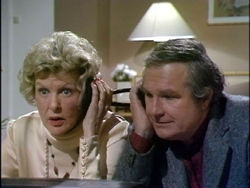 in "Taste" as a snooty wine expert who wagers his two houses against a new wife in a high-stakes bet. Elaine Stritch returns for "My Lady Love, My Dove," a promising but ultimately weak tale about a couple who turn to eavesdropping on their houseguests. Joan Collins gets a more lively vehicle with "Georgy Porgy" as a seductress who woos a parish priest with an inconvenient fear of the fairer sex. Joseph Cotten returns for "Depart in Peace," teamed up with the great Gloria Grahame (The Big Heat) in the story of an art collector who learns a nasty secret about his girlfriend and turns to a painter for aid. In "The Umbrella Man," a suspicious old umbrella vendor (John Mills) sells his wares to a woman whose lover (Michael Gambon) might not be so honest either. A young couple in 19th century Germany is plagued by infant deaths and fears their latest impending arrival might be next in "Genesis & Catastrophe," while Jack Weston reprises his role from "A Dip in the Pool" in "Mr. Botibol's First Love," a fantasy-laden episode in which the title character's daydreams as a concert conductor prove incompatible with his new girlfriend (Peeping Tom's Anna Massey). Richard Johnson (The Haunting) plays a doctor with a green thumb who has different plans for burying his wife (Sian Phillips) in "Back for Christmas," while serial wife-killer Robert Lang (The Medusa Touch) finds his hobby a bit more difficult than usual in "The Orderly World of Mr.
in "Taste" as a snooty wine expert who wagers his two houses against a new wife in a high-stakes bet. Elaine Stritch returns for "My Lady Love, My Dove," a promising but ultimately weak tale about a couple who turn to eavesdropping on their houseguests. Joan Collins gets a more lively vehicle with "Georgy Porgy" as a seductress who woos a parish priest with an inconvenient fear of the fairer sex. Joseph Cotten returns for "Depart in Peace," teamed up with the great Gloria Grahame (The Big Heat) in the story of an art collector who learns a nasty secret about his girlfriend and turns to a painter for aid. In "The Umbrella Man," a suspicious old umbrella vendor (John Mills) sells his wares to a woman whose lover (Michael Gambon) might not be so honest either. A young couple in 19th century Germany is plagued by infant deaths and fears their latest impending arrival might be next in "Genesis & Catastrophe," while Jack Weston reprises his role from "A Dip in the Pool" in "Mr. Botibol's First Love," a fantasy-laden episode in which the title character's daydreams as a concert conductor prove incompatible with his new girlfriend (Peeping Tom's Anna Massey). Richard Johnson (The Haunting) plays a doctor with a green thumb who has different plans for burying his wife (Sian Phillips) in "Back for Christmas," while serial wife-killer Robert Lang (The Medusa Touch) finds his hobby a bit more difficult than usual in "The Orderly World of Mr. 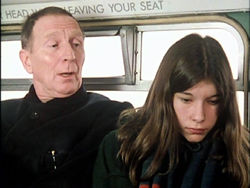 Appleby." Then a penniless sailor (Equus' Peter Firth) kills and robs a man and tries to quickly book a trip out on a boat via a smuggling operation as soon as he finds "The Man at the Top."
Appleby." Then a penniless sailor (Equus' Peter Firth) kills and robs a man and tries to quickly book a trip out on a boat via a smuggling operation as soon as he finds "The Man at the Top."
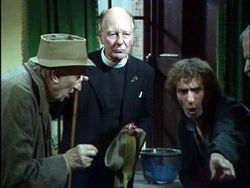 (Julian Fellowes and Zardoz's Bosco Hogan) start up a business offering payback for victims of vicious gossip columnists, but with a sting in the tale. Joan Collins vamps it up in "A Girl Can't Always Have Everything" as schming actress Suzy Starr, whose plot to ensnare a rich beau involves the possibly unwilling cooperation of her irritated friend and costar Pat (Pauline Collins). Then John Gielgud takes his turn as grifter Cyril Boggis in the droll and entertaining "Parson's Pleasure," which finds him posing as a parson to make off with a village's valuables for pennies. Denholm Elliott stars as a mild-mannered accountant pushed to the brink in "The Stinker" when his wife catches the lascivious gaze of his nasty boss (Joss Ackland), a former tormenter from their school days together. In the nifty "I'll Be Seeing You," married Arthur Trent (These Are the Damned's Anthony Valentine) is forced into a quandry when he asks his wife for a divorce to be with his blind girlfriend, who needs surgery; instead the wife refuses and says she'll pay for eye surgery if he stops cheating on her. In "The Party," toy company manager Robert Morley catches wind of a corporate party to which he has not been invited and feels that he's being rudely phased out of the company... or is he? Richard Johnson and Nigel Baker (Pennies from Heaven) make a good duo as archeologists who discover a valuable piece of art during a dig in the Jordanian desert but run afoul of forces far greater than they imagined. In "Vicious Circle," an old lady (Siobhan McKenna again) catches a robber breaking into her apartment but proves strangely friendly to the intruder for reasons of her own. In "The Boy Who Talked with Animals," a young boy's uncanny communication skills with a sea turtle prove unsettling when both disappear, leaving the amazing and curious Stuart Whitman to unravel the mystery.
(Julian Fellowes and Zardoz's Bosco Hogan) start up a business offering payback for victims of vicious gossip columnists, but with a sting in the tale. Joan Collins vamps it up in "A Girl Can't Always Have Everything" as schming actress Suzy Starr, whose plot to ensnare a rich beau involves the possibly unwilling cooperation of her irritated friend and costar Pat (Pauline Collins). Then John Gielgud takes his turn as grifter Cyril Boggis in the droll and entertaining "Parson's Pleasure," which finds him posing as a parson to make off with a village's valuables for pennies. Denholm Elliott stars as a mild-mannered accountant pushed to the brink in "The Stinker" when his wife catches the lascivious gaze of his nasty boss (Joss Ackland), a former tormenter from their school days together. In the nifty "I'll Be Seeing You," married Arthur Trent (These Are the Damned's Anthony Valentine) is forced into a quandry when he asks his wife for a divorce to be with his blind girlfriend, who needs surgery; instead the wife refuses and says she'll pay for eye surgery if he stops cheating on her. In "The Party," toy company manager Robert Morley catches wind of a corporate party to which he has not been invited and feels that he's being rudely phased out of the company... or is he? Richard Johnson and Nigel Baker (Pennies from Heaven) make a good duo as archeologists who discover a valuable piece of art during a dig in the Jordanian desert but run afoul of forces far greater than they imagined. In "Vicious Circle," an old lady (Siobhan McKenna again) catches a robber breaking into her apartment but proves strangely friendly to the intruder for reasons of her own. In "The Boy Who Talked with Animals," a young boy's uncanny communication skills with a sea turtle prove unsettling when both disappear, leaving the amazing and curious Stuart Whitman to unravel the mystery.
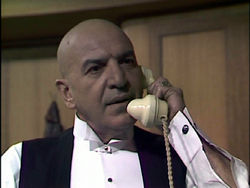 girlfriend gets involved. The amusing "Completely Foolproof" features Telly Savalas as a husband planning to do away with his wife, but of course his perfect plan has a hidden snag. Young couple Frank Finlay (Lifeforce) and Heather Sears (Hammer's Phantom of the Opera) get an unexpected inheritance in "There's One Born Every Minute" and decide to gamble it on a risky bit of property, yielding surprising returns. In "Bosom Friends," two female schoolmates - one rich, one poor - meet years later and decide to live on the same property, with disastrous results. In "The Way To Do It," a frustrated mother's boy (Andrew Ray) turns to a casino hostess (Elaine Page) and the gambling life for escape but finds the stakes alarmingly high. Finally, "Hijack" is a taut tale of an explosives-strapped hijacker who holes up in the lavatory with a hostage, demanding a million dollars and a parachute - though of course he doesn't quite get what he wished for.
girlfriend gets involved. The amusing "Completely Foolproof" features Telly Savalas as a husband planning to do away with his wife, but of course his perfect plan has a hidden snag. Young couple Frank Finlay (Lifeforce) and Heather Sears (Hammer's Phantom of the Opera) get an unexpected inheritance in "There's One Born Every Minute" and decide to gamble it on a risky bit of property, yielding surprising returns. In "Bosom Friends," two female schoolmates - one rich, one poor - meet years later and decide to live on the same property, with disastrous results. In "The Way To Do It," a frustrated mother's boy (Andrew Ray) turns to a casino hostess (Elaine Page) and the gambling life for escape but finds the stakes alarmingly high. Finally, "Hijack" is a taut tale of an explosives-strapped hijacker who holes up in the lavatory with a hostage, demanding a million dollars and a parachute - though of course he doesn't quite get what he wished for.
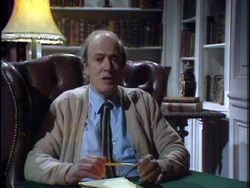 be more stagebound. (All of Dahl's intros were shot on video regardless of the format.) Obviously the episodes vary wildly in quality; the first two seasons tend to rely heavily on Dahl's material, while later shows incorporate a higher amount of work from other writers like Robert Bloch and Elizabeth Taylor (the mystery writer, not the actress). Surprisingly, some of Dahl's shining moments as a writer don't quite come off on the small screen; in particular, "The Landlady" - a wonderfully grim five-page yarn that leaves its nastiness to the imagination - lands on the screen with a thud by literally showing everything the literary version implied. Episodes revolving around feuding and dishonest couples or con artists tend to fare the best, and it's always fun to watch a cast list of this caliber digging into such rich material. Most of the tales tend to be mild diversions, a good way to pass half an hour without any huge shocks or explosions of violence; though sedate by today's standards and not quite as sturdy as some of the more famous anthology shows, this is a quaint, morbid, entertaining series that's held up admirably with age.
be more stagebound. (All of Dahl's intros were shot on video regardless of the format.) Obviously the episodes vary wildly in quality; the first two seasons tend to rely heavily on Dahl's material, while later shows incorporate a higher amount of work from other writers like Robert Bloch and Elizabeth Taylor (the mystery writer, not the actress). Surprisingly, some of Dahl's shining moments as a writer don't quite come off on the small screen; in particular, "The Landlady" - a wonderfully grim five-page yarn that leaves its nastiness to the imagination - lands on the screen with a thud by literally showing everything the literary version implied. Episodes revolving around feuding and dishonest couples or con artists tend to fare the best, and it's always fun to watch a cast list of this caliber digging into such rich material. Most of the tales tend to be mild diversions, a good way to pass half an hour without any huge shocks or explosions of violence; though sedate by today's standards and not quite as sturdy as some of the more famous anthology shows, this is a quaint, morbid, entertaining series that's held up admirably with age.
